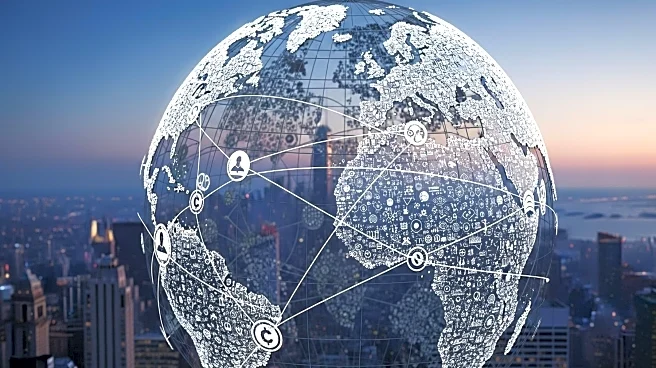What's Happening?
The World Trade Organization (WTO) has projected a significant slowdown in global goods trade growth by 2026 due to the delayed effects of tariffs imposed by President Trump. The WTO's recent report indicates that while merchandise trade volumes are expected to rise by 2.4% in 2025, this growth will decelerate to just 0.5% in 2026. This shift is attributed to the full impact of tariffs on US imports, which are expected to manifest fully next year. The report highlights that the initial resilience in trade was driven by AI-related goods, which saw a 20% increase in trade, contrasting with a less than 4% growth in non-AI goods. The WTO Director-General, Ngozi Okonjo-Iweala, emphasized the stability provided by a core group of economies despite unilateral trade measures.
Why It's Important?
The anticipated slowdown in trade growth due to tariffs could have significant implications for global economic stability and US trade relations. The tariffs, initially intended to protect domestic industries, may lead to reduced business and consumer confidence, slower employment growth, and decreased incomes. This could affect US industries reliant on international trade, potentially leading to higher costs for consumers and businesses. The reliance on AI-related goods for trade growth underscores the importance of technology sectors in sustaining economic momentum. However, the broader economic impact of tariffs could overshadow these gains, affecting global supply chains and economic partnerships.
What's Next?
As the full impact of tariffs is expected to be felt in 2026, businesses and policymakers may need to prepare for potential disruptions in trade and economic activity. Companies might seek to diversify supply chains or explore new markets to mitigate tariff impacts. Policymakers could face pressure to negotiate trade agreements or adjust tariff policies to stabilize economic conditions. The focus on AI-related goods suggests that innovation and technology sectors may continue to play a crucial role in driving trade growth, potentially influencing future trade policies and economic strategies.
Beyond the Headlines
The WTO's report highlights the complex interplay between trade policies and global economic dynamics. The delayed impact of tariffs raises questions about the long-term effectiveness of protectionist measures and their unintended consequences on global trade. The emphasis on AI-related goods also points to a potential shift in global trade patterns, where technology and innovation become central to economic growth. This could lead to increased competition among nations to lead in technological advancements, influencing global economic power dynamics.









